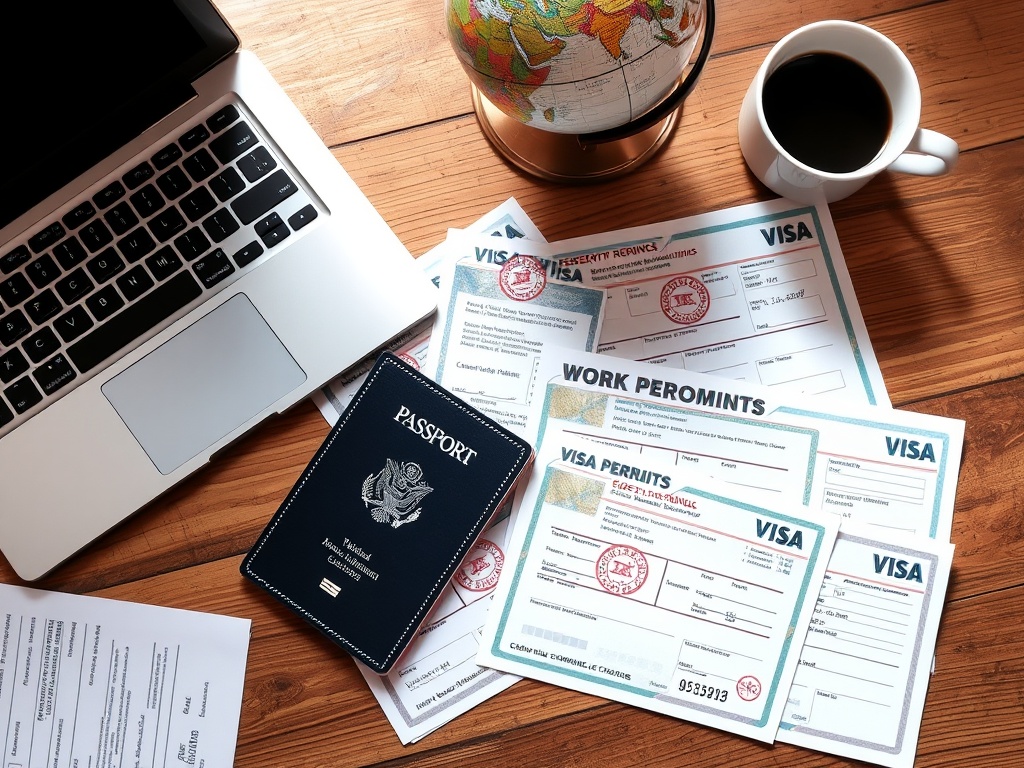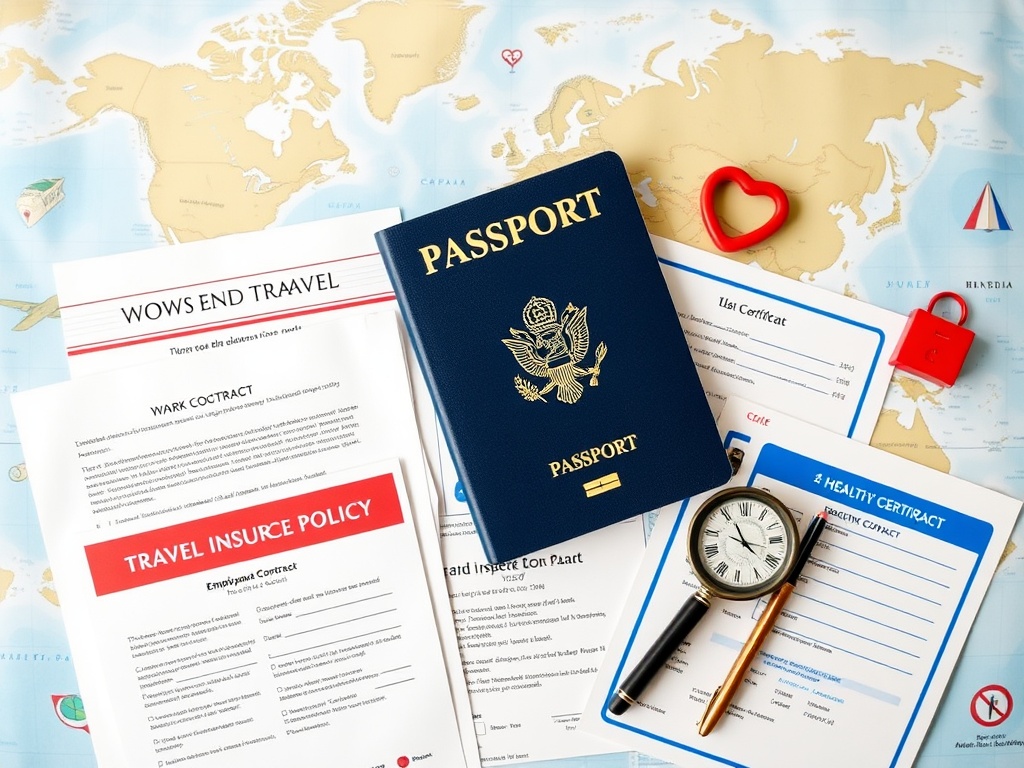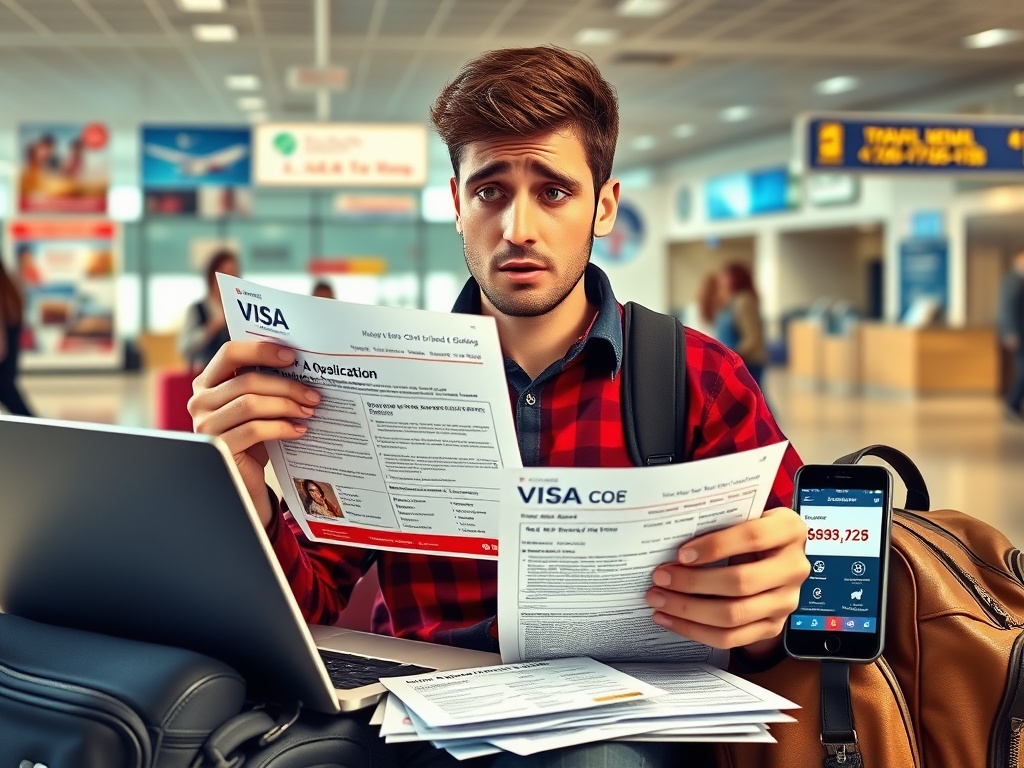The Backbone of Your Journey: Essential Work Permits and Visas

The Importance of Work Permits and Visas
When planning to work abroad, understanding the legal requirements is crucial. Work permits and visas serve as the backbone of your journey, ensuring that you can legally participate in employment opportunities while experiencing a new culture. Without these essential documents, you risk facing legal challenges that could jeopardize your travel plans and career aspirations.
Understanding Different Types of Work Permits and Visas
Each country has its own regulations regarding work permits and visas, which can be confusing. Knowing the differences between them is essential for a smooth application process. Below is a comparison of the most common types of work permits and visas:
| Type | Description | Duration | Eligibility |
|---|---|---|---|
| Work Visa | Required for foreign nationals to work in a host country. | Varies by country | Job offer from a local employer |
| Student Visa | Allows students to work part-time while studying. | Duration of study program | Enrollment in a recognized institution |
| Temporary Work Permit | Short-term employment authorization. | Up to 1 year | Specific job offer or project |
| Permanent Work Permit | Long-term work authorization for skilled workers. | Indefinite | Proof of skills and employment |
Steps to Secure Your Work Permits and Visas
Applying for work permits and visas involves several steps, and preparation is key. The following list outlines the essential steps to successfully obtain these documents:
- Research: Understand the requirements for your destination country.
- Gather Documents: Collect necessary paperwork, including a valid passport, job offer, and any supporting documents.
- Submit Application: Complete and submit your application to the appropriate governmental authority.
- Interview Prep: Be ready for any interviews or additional assessments that may be required.
- Follow Up: Track your application status and respond promptly to any requests for information.
Guarding Your Rights: Understanding Employment Contracts Abroad

Decoding Employment Contracts: Your First Line of Defense
Before embarking on your adventure, it’s vital to comprehend the significance of employment contracts in protecting your rights while working abroad. These contracts act as a legal safeguard, outlining the terms of your employment relationship and setting expectations for both you and your employer. A thorough understanding of this document not only empowers you but also ensures that you are aware of your obligations and entitlements.
When you receive an employment contract, it’s important to examine it closely. Look for key elements such as job responsibilities, salary and benefits, working hours, and termination clauses. Each of these components provides insight into what you can expect during your tenure and can significantly impact your overall experience.
Navigating Cultural Nuances in Contracts
Working in a foreign country often means encountering different attitudes towards employment contracts and workplace rights. In some cultures, verbal agreements may hold considerable weight, while others prioritize written documentation. Recognizing these cultural nuances can be advantageous. For example, in countries with strong labor laws, your contract may be heavily regulated, offering you more protection. Conversely, in regions where regulations are lax, you may need to be more vigilant.
It’s wise to seek clarification on any terms that seem ambiguous or unfair. If possible, consult with local professionals or expats who understand the legal landscape and can help you interpret your contract. This proactive approach can prevent misunderstandings and ensure that your rights are upheld, allowing you to focus on enjoying your international experience.
Taking Action: What to Do If Things Go Wrong
Despite your best efforts, there may be circumstances where your rights are compromised. Knowing how to react in these situations is essential. Start by documenting any incidents or discrepancies related to your employment contract. This evidence will be crucial if you need to take further action.
In many countries, labor unions or worker’s rights organizations can provide resources and support. Engaging with these groups can empower you to address grievances effectively, whether that involves negotiating with your employer or seeking legal counsel. Remember, protecting your rights is not just about compliance; it’s about ensuring a fair and enriching work experience abroad.
Health is Wealth: The Importance of Travel Insurance Documents
While the thrill of working and traveling abroad is undeniable, ensuring your health and safety is paramount. One crucial component of your travel preparation is obtaining travel insurance. This document is often overlooked, yet it plays a significant role in safeguarding you against unforeseen medical expenses and emergencies that could arise in a foreign environment. Understanding the importance of travel insurance can help you make informed decisions during your journey.
Understanding Travel Insurance: Coverage Options
Travel insurance is not a one-size-fits-all solution; it comes in various forms, each tailored to meet different needs. Familiarizing yourself with the types of coverage available will empower you to select a policy that best fits your situation. Common coverage options include:
- Medical Coverage: Covers expenses related to illness or injury during your trip.
- Trip Cancellation: Reimburses non-refundable expenses if you need to cancel your trip for covered reasons.
- Emergency Evacuation: Provides transportation to a medical facility in case of a serious health issue.
- Lost or Stolen Belongings: Compensates for the loss of luggage or personal items.
Choosing the Right Policy: Key Considerations
When selecting a travel insurance policy, several factors require careful consideration to ensure comprehensive protection. Here are essential steps to guide your decision-making process:
- Assess Your Needs: Evaluate the destination, duration, and activities planned to determine the necessary coverage.
- Read the Fine Print: Understand the exclusions and limitations of the policy to avoid surprises in times of need.
- Compare Providers: Research different insurance companies and their offerings to find the most reliable and suitable policy.
- Check Reviews: Look at customer feedback and ratings to gauge the quality of service and claims process.
- Consult with Professionals: If unsure, seek advice from travel agents or insurance brokers who can provide valuable insights.
Peace of Mind: The Value of Being Prepared
Investing in travel insurance not only provides financial protection but also peace of mind. It allows you to focus on your work and explorations without the constant worry of what might happen should an emergency arise. In a world where health risks can be unpredictable, ensuring you have the right travel insurance is a vital step in making your journey enriching and enjoyable.
The Safety Net: Liability Waivers and Release Forms Explained
In the realm of work and travel, the importance of understanding liability waivers and release forms cannot be overstated. These documents serve as critical safety nets that protect both participants and organizations from potential legal repercussions. By clarifying the responsibilities and risks involved, these forms help foster a sense of security while you embark on your international journey.
Unpacking Liability Waivers: What You Need to Know
Liability waivers are legal documents that participants sign to acknowledge the risks associated with their activities and agree not to hold the organization accountable for any injuries or damages that may occur. While they may seem daunting, comprehending these waivers is essential for safeguarding your rights and making informed decisions.
Key Components of Liability Waivers
Understanding the structure of liability waivers can demystify the process and make it easier to navigate. Here are the primary elements you should look for when reviewing a waiver:
| Component | Description |
|---|---|
| Identification | Details of the parties involved, including the organization and the participant. |
| Risk Disclosure | A thorough explanation of the potential risks associated with the activity. |
| Release Clause | A statement where the participant agrees to release the organization from liability. |
| Signature and Date | Confirmation that the participant has read and understood the waiver. |
Making Sense of Release Forms: A Necessary Step
Release forms, while similar to liability waivers, often apply to specific activities or events. They are designed to protect organizations when participants engage in activities that could lead to injury or damage. These documents are vital in providing clarity and establishing boundaries around responsibilities.
When presented with a release form, it’s crucial to read it carefully and ask questions if anything is unclear. Understanding the implications of these documents is key to ensuring your safety and peace of mind during your travels.
In summary, being aware of liability waivers and release forms not only empowers you as a participant but also enhances the overall travel experience. By taking the time to comprehend these essential legal documents, you are better equipped to navigate the exciting yet sometimes unpredictable world of work and travel.
Navigating the Legal Landscape: Tax Compliance and Documentation
Embarking on an international work and travel adventure offers the exciting prospect of exploring new cultures and gaining invaluable experiences. However, as you navigate this journey, it’s crucial to also consider the legal obligations that come with it, particularly in terms of tax compliance. Understanding your tax responsibilities in a foreign country may seem overwhelming, but with the right knowledge and documentation, you can ensure that you remain compliant while enjoying your adventure.
Understanding Tax Obligations in Foreign Countries
Each country has its own tax laws, and as a foreign worker or traveler, you may be subject to local taxation based on your income and residency status. It’s essential to grasp the concept of tax residency, which determines whether you are considered a resident or non-resident for tax purposes. Generally, if you stay in a country for more than 183 days within a tax year, you may be required to file local taxes.
Moreover, many countries have tax treaties to prevent double taxation, allowing you to avoid being taxed on the same income in both your home and host country. Therefore, it’s beneficial to research whether your home country has such agreements and to understand how they may impact your tax obligations.
Essential Documentation for Tax Compliance
When it comes to managing taxes abroad, having the right documentation is vital. Start by ensuring you have a valid Tax Identification Number (TIN) or equivalent in your host country, as this will be necessary for filing your taxes. Additionally, keep track of your income and relevant expenses throughout your stay, as this information will be crucial for your tax report.
It’s also wise to maintain records of your foreign bank accounts and any financial transactions, as some countries require disclosure of foreign accounts for tax purposes. In cases where you may be eligible for tax deductions or credits, having detailed documentation will support your claims and help you avoid issues with local tax authorities.
Consulting Professionals for Clarity
Navigating the intricate tax landscape can be challenging, which is why seeking guidance from tax professionals who specialize in expatriate taxation is highly recommended. These experts can provide tailored advice based on your unique situation, ensuring that you meet all obligations without incurring unnecessary penalties.
In conclusion, while the thrill of working and traveling abroad is immensely rewarding, taking the time to understand and comply with tax regulations is essential. By being proactive and informed, you can focus on enjoying your journey while confidently managing your legal responsibilities.
Your Identity Secured: The Necessity of Valid Identification and Passports
Understanding the Role of Identification in Your Journey
As you prepare for your adventure abroad, one of the most critical elements to consider is your identification. Without valid identification, including your passport, you may encounter significant obstacles that can hinder your travel experience. Valid identification serves not only as a means of verifying your identity but also as a gateway to accessing various services, including employment, banking, and healthcare, in your host country. It is essential to comprehend the importance of maintaining proper identification to ensure a smooth transition into your new environment.
The Passport: Your Global Key
Your passport is often described as your global key—an indispensable document that allows you to traverse international borders. Beyond its function as a travel document, your passport is a symbol of your nationality and, in many cases, a requirement for various legal processes abroad. When applying for work permits or visas, your passport will be a necessary reference point, as it contains vital information such as your nationality, date of birth, and unique identification number.
As you navigate the passport application process, it is advisable to check the expiration date. Many countries require that your passport be valid for at least six months beyond your intended date of return, a stipulation designed to prevent complications during your travels. Failure to meet this requirement could result in being denied entry or facing unexpected challenges.
Identification Beyond the Passport: Additional Documents
While your passport is paramount, it is equally important to recognize that other forms of identification can also enhance your security and ease of access while working abroad. These may include a national ID card, driver’s license, or any government-issued identification that carries your photo and personal information. Having multiple forms of identification can be beneficial in various scenarios, such as verifying your identity at workplaces or during emergency situations.
Additionally, carry copies of these documents—both physical and digital—stored securely in separate locations. This precaution ensures that if your primary identification is lost or stolen, you will have backup options readily available. In foreign countries, being prepared with the right identification not only protects your identity but also empowers you to navigate the complexities of international employment and travel.
Empowering Your Experience: Essential Emergency Contact and Safety Plans
As you embark on your journey of work and travel, ensuring your safety should be a top priority. Emergencies can occur without warning, and having a robust emergency contact and safety plan in place can empower you to navigate unforeseen challenges effectively. By taking proactive measures, you not only safeguard your well-being but also enhance your overall travel experience.
Creating Your Safety Network is the first step in establishing an effective emergency plan. Start by identifying key contacts, both at home and in your host country. This may include family members, close friends, and local authorities such as the embassy or consulate. Documenting these contacts along with their phone numbers and email addresses in an easily accessible format, such as a mobile app or physical notebook, ensures that you can reach out for help quickly if needed. Additionally, it’s wise to share your travel itinerary and emergency plan with someone you trust back home, so they are aware of your whereabouts.
Next, develop a comprehensive safety plan tailored to the specific risks of your destination. Research the local emergency services, including police, medical facilities, and fire departments, and familiarize yourself with the emergency numbers in your host country. This knowledge can be crucial during a crisis when time is of the essence. Furthermore, consider enrolling in local safety programs or workshops that teach essential skills, such as first aid or self-defense, which can empower you and provide peace of mind.
In addition to these preparations, maintaining digital backups of important documents is essential. Scan and save copies of your passport, visa, travel insurance, and emergency contacts in a secure cloud storage service. This ensures that even if you lose your physical documents, you can access vital information from anywhere with an internet connection. Remember, being prepared is not only about safeguarding your personal belongings but also about ensuring you have the necessary resources to act swiftly in case of an emergency.
Finally, staying informed about your surroundings is a crucial element of your safety plan. Regularly check local news and government travel advisories for updates on safety conditions in your area. Engaging with local expatriate communities or forums can also provide valuable insights and recommendations on navigating potential risks. By taking these steps, you are not just preparing for emergencies; you are cultivating a sense of empowerment that will enrich your work and travel experience.



